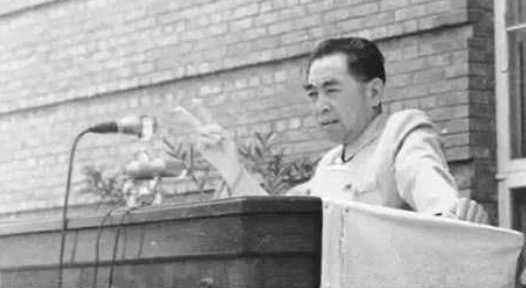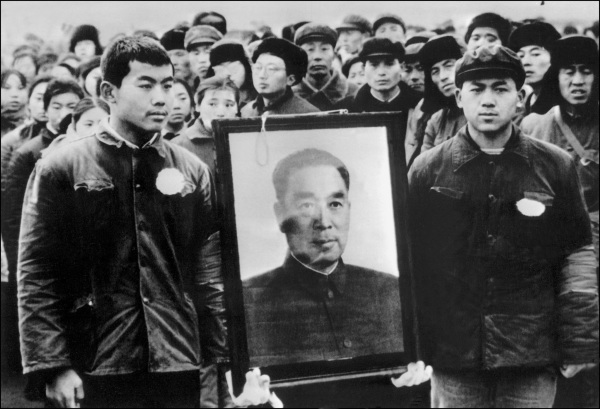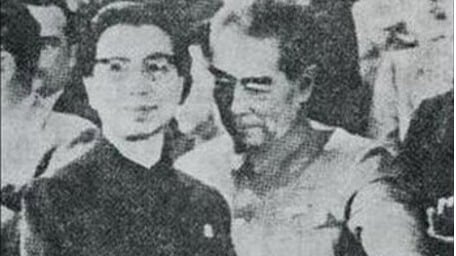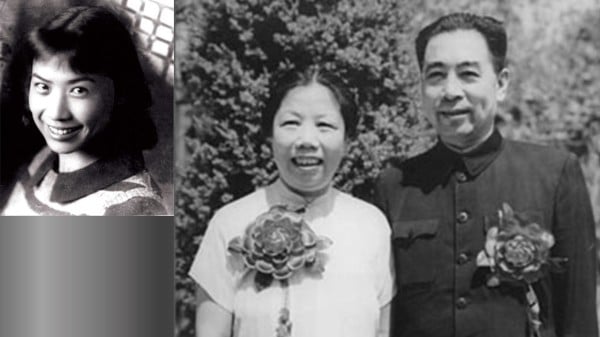[ad_1]

Why did Zhou Enlai become the “faithful figure” in the catastrophe of the Cultural Revolution?tumbler“? (Picture source: Internet picture)
Looking back on ten years todayCultural RevolutionDuring the catastrophe, we will find such an incredible phenomenon: as early as the Yan’an period, we were the first to propose “Mao Zedong“Ideology”, the second-ranking figure in the CCP who was loyal to MaoLiu Shaoqidied tragically in Kaifeng, Henan, and his body was cremated under the pseudonym “Liu Weihuang”; he was praised by Mao Zedong as “the sword cuts and the horse rises”Peng Dehuaidied tragically in the 301 Hospital, and his body was cremated under the pseudonym “Wang Chuan”; he was praised by Mao Zedong as “Xiao He who guards the rear of the border area”He Longdied tragically in the 301 Hospital, and his body was cremated under the pseudonym “Wang Yu”; even during the Jinggangshan period, “Zhu Mao did not separate the family”Zhu DeAll were hit by the catastrophe. And why?Zhou EnlaiBut can he protect himself and become a “tumbler” in the catastrophe?

Zhou Enlai’s death in January 1976 triggered the April 5th Tiananmen Movement. What role did he play in the Cultural Revolution? (Image credit: AFP via Getty Images)
This article will unravel this mystery for everyone.
Mao Zedong wanted the Cultural Revolution, so Zhou Enlai became a “Cultural Revolutionist”
When Mao Zedong wanted to sing the drama of the Cultural Revolution, Zhou Enlai quickly packed up and set up a stage for Mao.
In 1966, Mao Zedong decided to establish the Central Cultural Revolution Group to guide the Cultural Revolution. This was originally a thing that was above the Central Committee of the Communist Party of China and was unjust and unjust, similar to the Gestapo, both within the party and the government system. In accordance with Mao’s instructions, Zhou Enlai proposed Mao’s favorite Chen Boda as the team leader and Mao’s wife Jiang Qing as the first deputy team leader at a meeting of the Political Bureau of the Communist Party of China. Jiang Qing made his fortune during the Cultural Revolution, and later became a member of the Political Bureau of the Communist Party of China, and became “I am Chairman Mao’s dog” during the Cultural Revolution. It started with Zhou Enlai’s proposal.
In order to provide public support for Mao Zedong’s Cultural Revolution, Zhou Enlai personally formed a Cultural Revolution document drafting group and drafted the iconic red-headed document “May 16 Notice” for launching the Cultural Revolution.
On May 21, 1966, just five days after the Central Committee of the Communist Party of China issued the “May 16 Notice,” Zhou Enlai made a speech of nearly 10,000 words at an enlarged meeting of the Political Bureau of the Communist Party of China, proposing for the first time that “disloyalty in the late festival should be written off with one stroke.” statement. This means that those who do not support Mao Zedong’s decision to launch the Cultural Revolution are “disloyal in the late festival”. No matter how great their previous achievements are, they deserve to be knocked down, thus justifying Mao Zedong’s actions of knocking down veteran cadres.
On August 18, 1966, the “Mass Meeting to Celebrate the Great Proletarian Cultural Revolution” was held in Tiananmen Square with one million people participating. This conference not only celebrated the closing of the Eleventh Plenary Session of the Eighth Central Committee of the Communist Party of China, but also served as a general mobilization for the comprehensive launch of the “Cultural Revolution”.
Data show that from August 18 to November 26, Mao Zedong inspected the Tiananmen Gate with a total of 11 million Red Guards, accounting for 1.6% of China’s total population at the time, creating a spectacle in the history of world inspections. Tiananmen Square and the city of Beijing experience a “red ocean” on average every 12 days. During these eight meetings with the Red Guards, Zhou Enlai’s role was actually that of the commander-in-chief at the meeting.
Song Yongyi, an expert on the Cultural Revolution, said: “Zhou Enlai has been a member of the Cultural Revolution since the 66th year of the Cultural Revolution until the Lin Biao incident. But he was not an upstart in the Cultural Revolution. He was not a direct descendant of the Cultural Revolution. Who would meet at the Central Cultural Revolution meeting? Presided over by Zhou Enlai. Of course he was the one who approved all these resolutions.”
Whoever Mao Zedong wants to use, Zhou Enlai will be used as a “meat trumpet”
During the Cultural Revolution, there were two figures who were very red in Mao Zedong’s eyes, one was Jiang Qing and the other was Lin Biao. Zhou Enlai followed Mao’s fancy and praised Jiang and Lin to the utmost, almost to the point of being disgusting.
1. Praise Jiang Qing

Zhou Enlai praised Jiang Qing. (Picture source: Internet picture)
Zhou Enlai’s praise of Jiang Qing continued throughout the Cultural Revolution. Especially in the early days of the Cultural Revolution, Zhou Enlai once strongly praised Jiang Qing. For example, at a meeting of 100,000 people in Beijing on March 27, 1968, Zhou Enlai took the initiative to introduce “Comrade Jiang Qing’s combat life.” He said that Jiang Qing had written “combat articles” and “red articles” and was “Chairman Mao’s close comrade-in-arms and diligent student” who “can help comrades enthusiastically and conscientiously” and “dare to take them out” on the enemy. He also took the lead in shouting the incomprehensible slogan twice at the conference: “Defend Comrade Jiang Qing to the death!”
At the Ninth National Congress of the Communist Party of China in 1969, Zhou Enlai personally nominated Jiang Qing to serve as a member of the Political Bureau of the Communist Party of China. Before that, Jiang Qing was not even an alternate member of the Central Committee of the Communist Party of China. At the 10th National Congress of the Communist Party of China in 1973, Zhou Enlai even nominated Jiang Qing to serve as a member of the Standing Committee of the Political Bureau of the Communist Party of China. Only this time Mao Zedong stopped him.
2. Praising Lin Biao
Zhou Enlai also spared no effort in admiring Lin Biao, another prominent figure in the Cultural Revolution. In August 1966, the Eleventh Plenary Session of the Eighth Central Committee of the Communist Party of China was held. Zhou Enlai understood Mao Zedong’s idea of promoting Lin Biao and actively recommended Lin Biao to become the second-ranked leader in the party. In order to highlight Lin Biao’s status as deputy commander-in-chief and successor, Zhou Enlai took the initiative to no longer mention his title of vice chairman of the Central Committee of the Communist Party of China, thus avoiding mentioning the titles of several other vice presidents, making Lin Biao the only vice chairman.
Zhou Enlai once publicly mentioned this matter many times in the early days of the Cultural Revolution and felt good about himself, saying that Lin Biao “is the best at learning and applying Mao Zedong Thought and follows Chairman Mao most closely. I recommend him as deputy commander-in-chief.”
At the Ninth National Congress of the Communist Party of China held in 1969, Mao Zedong wanted Zhou Enlai to serve as vice chairman, but Zhou Enlai refused in order to highlight Lin Biao’s successor status. At the plenary session on April 14, 1969, Zhou Enlai’s praise of Lin Biao reached its peak. Zhou said: “Comrade Lin Biao has always held high the great red flag of Mao Zedong Thought and implemented and defended Comrade Mao Zedong’s proletarian revolutionary line most loyally and resolutely.” “We are also grateful for the fact that we have Vice Chairman Lin, the universally recognized successor of Chairman Mao. Feeling very happy.”
In order to defeat Lin Biao, Zhou Enlai even went so far as to openly violate the common sense of the history of the Chinese Communist Party. He falsified the history of the meeting between Zhu De and Mao Zedong in Jinggangshan, and described Lin Biao, who was only a grassroots officer during the CCP’s Nanchang riots, as the leader who led the troops to join forces with Mao Zedong. He said: “After the failure of the Nanchang Uprising, Comrade Lin Biao led the troops to Jinggangshan and has been fighting beside Chairman Mao. Therefore, I say that the glorious representative of the Nanchang Uprising should be Comrade Lin Biao.”
Song Yongyi, an expert on the Cultural Revolution, said that Zhou Enlai’s relationship with Lin Biao was better than his relationship with Mao Zedong. After Lin Biao’s accident, Wang Dongxing copied out many things Zhou Enlai had given to Lin Biao from Lin Biao’s house, including many photos they had taken together and things given to Lin Biao. The article about the Lushan Conference written by Chen Guang (Qiu Huizuo’s son) said that Lin Biao repeatedly told the five kings under him to cooperate with Zhou Enlai during the Central Cultural Revolution Meeting. This was specially noted many times. Lin Biao said, “Zhou Enlai represents me.”
Whoever Mao Zedong wanted to beat, Zhou Enlai used it as a “beating stick”
While praising the Cultural Revolutionists, Zhou Enlai showed no mercy to those whom Mao Zedong wanted to defeat. Moreover, he had the right control over whether to beat the target to death with a stick or beat him to half-death before rescuing him.
1. Crazy persecution of Liu Shaoqi
Regarding Liu Shaoqi, the second most powerful person in the CCP, Mao Zedong wanted to put him to death and then be quick. Chen Kuide, editor-in-chief of “Observation” magazine, said: “Of course Zhou Enlai was more sympathetic to Liu Shaoqi’s line. But when the Cultural Revolution was launched, he chose sides. He knew Mao’s intentions earlier than Liu. Zhou was a very political figure. A clear person. He later chose to side with Mao.”
As the leader of the “Liu Shaoqi Special Investigation Team”, Zhou Enlai did not hesitate to work with Jiang Qing to frame Liu Shaoqi as “a great traitor, a great traitor, a great spy, a great scab, a great traitor… a counterrevolutionary who is full of five evils and heinous.” The circulation of incriminating evidence materials regarding Liu Shaoqi’s arrest and rebellion mentioned the need to “keep the evening festival” and used this to praise Jiang Qing.
Zhou Enlai wrote: “The spread of Mao Zedong Thought, the conveyance of Chairman Mao’s voice, and the implementation of Chairman Mao’s instructions are a test of whether we are enough to be a Communist Party member and whether we can maintain the standards of the late revolution. At this point, we want to ask you (Referring to Jiang Qing) Learn! I want to learn from you!”
The “late revolutionary festival” mentioned by Zhou Enlai here is actually absolute obedience to Mao Zedong. Jiang Qing then gave instructions from above: “Learn from Comrade Enlai! Encourage us together to ensure a good night!”
In October 1969, Zhou Enlai was personally responsible for sending senior CCP officials to other places for “war preparation evacuation.” Zhou Enlai handed over Liu Shaoqi to Wang Dongxing’s people to deal with it. Although Zhou Enlai was aware of Liu Shaoqi’s miserable situation at all times, there is no evidence that he ever helped Liu Shaoqi. As a result, Liu Shaoqi was tortured to death in Kaifeng City, Henan Province within a month. Zhou Enlai never expressed any guilt for Liu Shaoqi’s death.
2. Actively criticize Zhu De
Zhu De was once shouted “Long live” by the Chinese together with Mao Zedong. On May 18, 1966, the Political Bureau of the Communist Party of China held a meeting at the instruction of Mao Zedong to criticize Zhu De because he had a negative attitude towards criticizing “Peng Luo, Lu and Yang”. In his speech, Zhou Enlai accused Zhu De of making many line errors and “opposing Chairman Mao.” Zhou Enlai also used Mao Zedong’s words to suppress Zhu De, saying: “Chairman Mao once said that you are just a walk-on, but you talk nonsense everywhere. If you want to talk, you must write a manuscript and discuss it with us.” “You are unreliable and cannot Trusted.”
3. Bow 7 times to the portrait of He Long
Zhou Enlai only followed Mao Zedong’s lead. He would not protect those whom Mao wanted to overthrow, and would add insult to injury and aid him in his misfortune; while those who Mao wanted to protect or show mercy to, Zhou Enlai would actively protect them.
Zhou Enlai was He Long’s introducer to join the party, and the two had a close relationship. During the Nanchang riots of the CCP, Zhou Enlai was the supreme leader and He Long was the commander-in-chief of the riots. The 20th Army of the National Revolutionary Army led by He was the main force of the riot. At the beginning of the Cultural Revolution, He Long was in trouble. Zhou Enlai wanted to protect him and took He Long and his wife into his home.
However, after Mao Zedong decided to overthrow He Long, Zhou Enlai resolutely implemented it. Ye Qun proposed a special case to investigate He Long at the Cultural Revolution meeting. Zhou Enlai seconded the proposal. Zhou Enlai later personally announced to He Long that he would be censored on behalf of the Central Committee of the Communist Party of China. He also wrote hundreds of words of criticism on the arrest warrant for He Long, calling He Long “He Long” and “He Xiong”.
After the Lin Biao incident, Mao Zedong said: “It seems that He Long’s case is false.” At this time, He Long had already entered the urn under the name “Wang Yu”. Zhou Enlai had no choice but to send someone to take He Long’s widow Xue Ming back to Beijing from Guizhou. On June 9, 1975, Zhou Enlai attended the burial ceremony of He Long’s ashes despite being ill. He delivered a eulogy in person, bowed to the portrait of He Long seven times, and cried and apologized to Xue Ming for “not protecting” He Long.
4. Apologize to Yang Chengwu
At the beginning of the Cultural Revolution, Yang Chengwu, the acting chief of general staff of the Chinese army, was overthrown. Zhou Enlai knew that this was an unjust case, but not only did he not speak for Yang Chengwu, but he agreed with Mao Zedong to add insult to injury.
After Lin Biao fell, Mao Zedong said that Yang Chengwu’s case might be wrong. Zhou Enlai began to protect the safety of Yang Chengwu and his wife. Yang Chengwu later recalled that Zhou Enlai apologized to him on July 31, 1974 and said: “Chengwu, at the meeting where Lin Biao framed you, in order to respect the chairman’s decision, I also said things that were against my will and wrong words. I apologize to you.”
Whoever Mao Zedong wants to protect, Zhou Enlai will “send warmth”
Whoever Mao Zedong wanted to beat, Zhou Enlai almost always beat him to death with a stick. Deng Xiaoping, who had “three ups and downs”, was an exception. Because Mao Zedong clearly instructed that he should be treated differently from Liu Shaoqi. A reporter once asked Song Yongyi, an expert on the Cultural Revolution:
Reporter: Was Zhou Enlai dissatisfied with Deng Xiaoping?
Song: Zhou Enlai’s dissatisfaction with Deng Xiaoping was obvious in the early days of the Cultural Revolution. Zhou Enlai made a lot of remarks criticizing Liu Shaoqi and Deng Xiaoping.
After the Lin Biao incident, Mao Zedong considered bringing Deng Xiaoping back. Zhou Enlai immediately announced the lifting of “supervisory labor” over Deng Xiaoping. He personally called Jiangxi party and government leaders to inquire in detail about the living arrangements of Deng Xiaoping’s family. He also told Jiangxi provincial leaders Mo Xini: , Deng Xiaoping “went to the countryside for training.”
On December 18, 1972, Zhou Enlai took advantage of Mao Zedong’s opportunity to affirm Deng Xiaoping’s achievements and secretly asked Mao Zedong’s cronies Ji Dengkui and Wang Dongxing to write a letter proposing to resume Deng Xiaoping’s work. Zhou then took this letter to ask Mao Zedong for instructions, and he gave it to Mao Zedong. At the foot of the stairs, Mao followed Mao’s wishes again. Mao readily agreed, and Deng Xiaoping returned.
Sacrificing his goddaughter, brother, and captain of the guard

Zhou Enlai, Deng Yingchao, and goddaughter Sun Weishi in 1954. The arrest warrant for his goddaughter was signed by Zhou Enlai. (Image source: Public Domain View China Synthesis)
In order to show his absolute support for the Cultural Revolution, Zhou Enlai even sacrificed those closest to him.
Mr. Ruan Ming, who once served as deputy director of the Theoretical Research Office of the Party School of the Central Committee of the Communist Party of China, wrote in an article in 1994: “While investigating the crimes of the ‘Gang of Four’, it was found that almost all of the unjust cases of those who were brutally persecuted during the Cultural Revolution were included in the arrest warrants. All were signed by Zhou Enlai, including the arrest of his own goddaughter Sun Weishi.”
In 1968, under Jiang Qing’s pressure, Zhou Enlai signed to approve the arrest of Sun Weishi. A few months later, Sun Weishi died tragically in prison.
Cheng Yuangong, the chief of Zhou Enlai’s guards, had followed Zhou Enlai for decades and was loyal. In March 1968, Jiang Qing unintentionally offended Jiang Qing, who wanted to arrest Cheng Yuangong. Deng Yingchao told Wang Dongxing on behalf of Zhou Enlai: “We must arrest Cheng Yuan Gong, which shows that we have no selfish motives.” According to common sense, beating a dog depends on the owner. This is good, the owner pushed the guard dog onto the dog meat cart. So Cheng Yuangong was sent to the “May 7th Cadre School” in Jiangxi, where he stayed for nearly eight years.
During the Cultural Revolution, Jiang Qing gave Zhou Enlai the materials that exposed Zhou Enlai’s younger brother Zhou Tongyu (original name: Zhou Enshou) and told him to take care of it. Zhou’s instructions: Arrest Zhou Tongyu immediately, and indicate how many people are in Zhou Tongyu’s family and their address.
Although information disclosed after the Cultural Revolution stated that Zhou Enlai was worried that his younger brother would be persecuted by the Red Guards, so he asked the Beijing Garrison District to arrest Zhou Tongyu and “protect” him. But Zhou Tongyu was imprisoned for 7 years and was not released until May 1975. From Zhou’s agreement with Jiang Qing, others suspect that Zhou’s starting point is not necessarily to protect his younger brother, but to be loyal to Jiang and “eliminate relatives for justice.”
Refuse to arrest the “Gang of Four”
In Zhou Enlai’s last days, Ye Jianying visited Zhou Enlai in the hospital every day. One day, Ye and Zhou had their last conversation. Zhou Enlai’s security personnel recalled that Ye Jianying asked all guards and nursing staff to withdraw at that time. Before leaving after the conversation, Ye also told the staff to record at any time Zhou Enlai’s thoughts and views on certain people in the Central Committee. As a result, Zhou Enlai “didn’t even say a word.”
What exactly Ye Jianying and Zhou Enlai said is unknown to outsiders. However, Ye Jianying later said that many people in the party came to him and proposed taking action to arrest the “Gang of Four”. Ye Jianying tested Zhou Enlai’s tone. Zhou Enlai still believed in Chairman Mao and listened to the Chairman’s words. Ye Jianying said that Zhou Enlai was unwilling to discuss this topic. This may be the content of Ye’s “last conversation” with Zhou.
The reason why Zhou Enlai made arresting the “Gang of Four” his “forbidden zone” was because he knew well the importance of the Cultural Revolution in Mao Zedong’s heart. Mao Zedong once said that he did two major things in his life, one of which was the Cultural Revolution. To arrest the “Gang of Four” is actually to deny the Cultural Revolution. For Mao Zedong, this was tantamount to “breaking ground on Tai Sui’s head.” He wouldn’t dare to do it even if he lent Zhou the courage.
Only Mao followed his lead and did not dare to cross the “Thunder Pond” until death.
On June 16, 1975, Zhou Enlai, who had undergone three major surgeries, wrote his last letter to Mao Zedong on his hospital bed. He wrote: “It has been forty years since the Zunyi Conference to this day. Chairman Xi has been very kind and gentle, but he still keeps making mistakes, and even commits crimes. I feel extremely regretful. Now that I am ill, I have repeatedly recalled and reflected on it. Not only must I maintain my lateness, but I am also willing to write a new chapter. Decent opinions summed up.”
According to the memories of the staff around Zhou Enlai described in the book “Zhou Enlai Steps Down from the Altar”, until January 2, 1976, only a few days before his death, Zhou Enlai, on his deathbed, asked his staff to read to him Mao’s newly published Two poems, and with a last smile on his face, he said softly: “China has a Mao Zedong…”
Conclusion
Looking at what Zhou Enlai did during the Cultural Revolution, he became a “roly-poly” in the catastrophe and had complete professional qualifications.
In the courtroom where the Gang of Four was tried, Jiang Qing said in her defense, “I am Chairman Mao’s dog.”
So, what role did Zhou Enlai play in the Cultural Revolution? Judging only from the facts disclosed in this article, Zhou Enlai’s “abilities” are diverse: Is he a Maoist slave? A flatterer? A two-faced person? A hypocrite? Is he a traitor and a murderer of relatives? Is he someone who lives by his means, or is he someone who adapts to the wind? It’s just adding insult to injury… Everyone has different opinions.
Editor in charge: Zi Meng
Short URL:
All rights reserved. Reprinting in any form requires permission from this site. It is strictly prohibited to create mirror websites.
[Honorary Members Wanted]Streams can merge into the sea, and small kindnesses can achieve great love. We sincerely recruit 10,000 honorary members from Chinese people all over the world: each honorary member only needs to pay a subscription fee per year and become an honorary member of the “Look at China” website, which can help us break through censorship and blockade and provide services to at least 10,000 mainland Chinese compatriots. Provide independent and true key information to warn them in times of crisis and save them from pandemics and other social crises.


